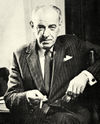Slow Burner
Authors [about]:
join in to develop this article! |
Slow Burner is a 1958 suspense novel by the British author William Haggard published in England by Cassell and in the United States by Little Brown. It was Haggard's first novel and the first of many involving his protagonist Colonel Charles Russell, the head of the unobtrusive but lethal Security Executive, a government counter-intelligence agency. Like most of the other works by Haggard and some by his near contemporaries Victor Canning and Michael Gilbert, it is both a standard novel of suspense and a semi-political thriller about the reactions of those in high government positions who scent potential danger to their own political standing from the on-going events of the novel.
Plot
Protagonist is perhaps too strong a word to describe Colonel Russell. As Haggard himself wrote about his fiction:
My novels are chiefly novels of suspense with a background of international politics. A Colonel Charles Russell of the Security Executive, a not entirely imaginary British counter-espionage organization, while not a protagonist in the technical sense, holds the story line together in the background by his operations, while the characters in the foreground carry the action."[1]
Nuclear Development, a British agency headed by William Nichol, has developed a valuable new source of atomic power called Slow Burner. Very small quantities of it can generate vast amounts of power, and, rather than needing enormous industrial plants to contain it once developed, useful quantities can be carried about in containers no larger than a suitcase. Unless properly handled, however, it emits deadly epsilon rays. It has, nevertheless, recently been successfully installed in a number of English factories and is now considered by the British Government to be a vital part of the country's future. Nichol, and Colonel Russell of the Security Executive, are surprised and upset to be told by Sir Jeremy Bates, a very senior Permanent Secretary, that intermittent readings of epsilon rays are being detected as coming from a modest private in in the London suburb of Dipley.
References
- ↑ From the back flap of the dust jacket of the Walker and Company American edition of The Conspirators, New York, 1967
